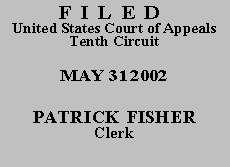

| UNITED STATES OF AMERICA,
Plaintiff - Appellee, v. EDMUNDO QUINONES-HERRERA, Defendant - Appellant. |
|
We review the district court's denial of the motion to withdraw Quinones-Herrera's guilty plea for abuse of discretion. See United States v. Siedlik, 231 F.3d 744, 748 (10th Cir. 2000). "The burden is on the defendant to establish a fair and just reason for the withdrawal of the plea." Id. (quotations omitted). Thus, "we will not reverse absent a showing that the trial court acted unjustly or unfairly." United States v. Kramer, 168 F.3d 1196, 1202 (10th Cir. 1999) (quotation omitted). In making this assessment, we look to several factors:
(1) whether the defendant has asserted his innocence; (2) prejudice to the
government if the motion is granted; (3) defendant's delay in filing the
withdrawal motion; (4) inconvenience to the court if the motion is granted;
(5) defendant's assistance of counsel; (6) whether the plea was knowing
and voluntary; and (7) the waste of judicial resources.
Id.
None of these factors weigh in favor of Quinones-Herrera. Most notably, and as the district court observed, Quinones-Herrera does not assert that his plea was anything but knowing and voluntary, nor does he assert his actual innocence. Instead, the basis for his request to withdraw the plea was his belief that he was eligible for an adjustment of status to that of a permanent legal resident pursuant to the LIFE Act Amendments. That legislation extended the time during which an alien physically but unlawfully present in the United States could seek an adjustment of status, pushing back the application deadline from January 14, 1998, until April 30, 2001.
In addition to the fact that none of the Kramer factors weigh in favor of allowing Quinones-Herrera to withdraw his plea, it is unlikely that he would have been eligible for a status adjustment even if he had made a timely application. In order to receive the discretionary status adjustment under § 1255(i), an alien must be "eligible to receive an immigrant visa and [be] admissible to the United States for permanent residence." 8 U.S.C. § 1255(i)(2)(A) (emphasis added). An alien who has been ordered removed from the United States, as Quinones-Herrera has, is inadmissable under 8 U.S.C. § 1182(a)(9)(A)(ii). Further, Quinones-Herrera is inadmissable under § 1182(a)(2)(B) as well, because he had been convicted of more than two offenses for which he was sentenced to a total of more than five years' imprisonment. Therefore, as the district court found, his chances of receiving a status adjustment were, at best, dim. And finally, even if Quinones-Herrera were to somehow qualify for a change in status, that would do nothing to eradicate his past immigration violations, including the one with which he is currently charged.
In sum, Quinones-Herrera has not shown that the district court unfairly or unjustly denied his motion to withdraw the guilty plea; to the contrary, the record shows that the district court engaged in a very careful analysis that resulted in a completely fair and just decision. Thus, the district court did not abuse its discretion.
Quinones-Herrera's second claim on appeal is that his enhanced sentence runs afoul of Apprendi v. New Jersey, 530 U.S. 466, 490 (2000), because the indictment did not set forth his prior aggravated felony convictions. This claim is foreclosed by Almendarez-Torres v. United States. 523 U.S. 224 (1998); see also United States v. Martinez-Villalva, 232 F.3d 1329, 133132 (10th Cir. 2000). The prior felony convictions used to enhance Quinones-Herrera's sentence were not elements of the offense that must be proved to a jury beyond a reasonable doubt. See Almendarez-Torres, 523 U.S. at 235. Enhancing a sentence on account of prior felony convictions falls squarely within the exception to the Apprendi holding. 530 U.S. at 490 ("Other than the fact of a prior conviction, any fact that increases the penalty for a crime beyond the prescribed statutory maximum must be submitted to a jury, and proved beyond a reasonable doubt." (emphasis added)). Quinones-Herrera's sentence does not violate Apprendi.
We AFFIRM.
ENTERED FOR THE COURT
Circuit Judge
*. After examining the briefs and appellate record, this panel has determined unanimously to grant the parties' request for a decision on the briefs without oral argument. See Fed. R. App. P. 34(f); 10th Cir. R. 34.1(G). The case is therefore ordered submitted without oral argument.
This order and judgment is not binding precedent, except under the doctrines of law of the case, res judicata, and collateral estoppel. The Court generally disfavors the citation of orders and judgments; nevertheless, an order and judgment may be cited under the terms and conditions of 10th Cir. R. 36.3.